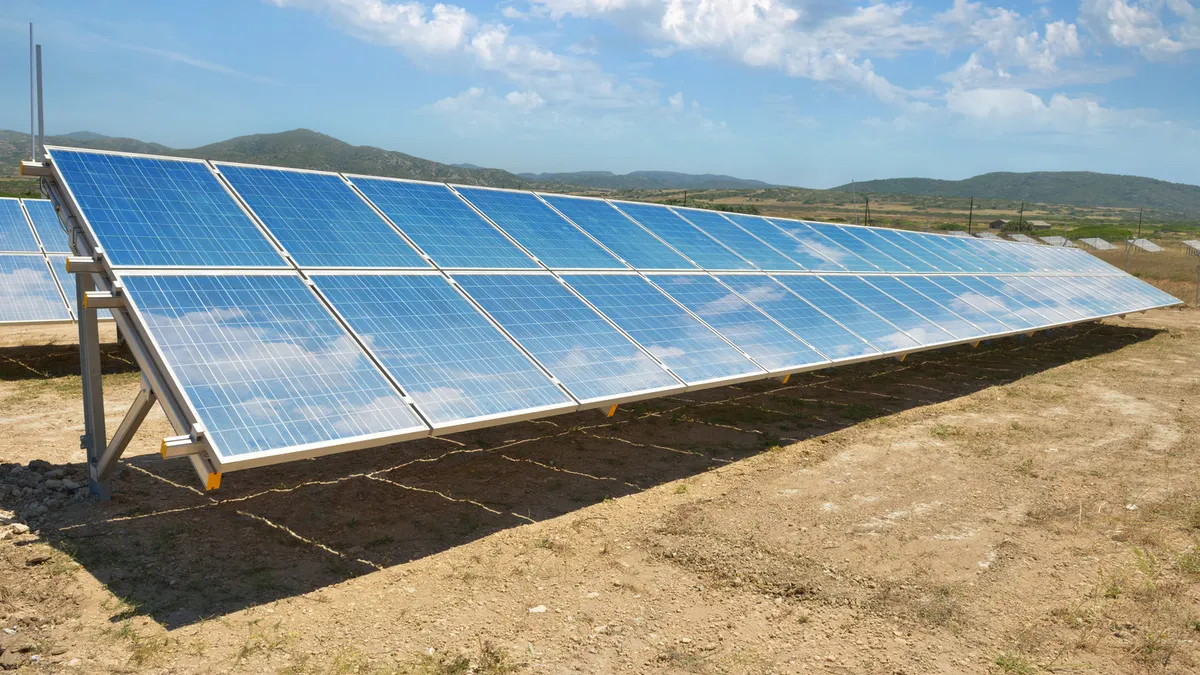Dive Brief:
- The Arizona Corporation Commission (ACC) voted down its proposed clean energy rules at Wednesday's open meeting, ending a three-year collaborative process with broad stakeholder and utility support to transition the state's generation to 100% clean resources by 2050.
- The rules were rejected 3-2 after commissioners approved an amendment from Commissioner Justin Olson that changed the clean energy mandates into goals, making the rules less enforceable. Olson proceeded to vote against the final package, noting in the hearing that he preferred a free market solution to resource choices in the state.
- The rejected rules would have created an all source requirement for utility request for proposals (RFP), an increase in energy efficiency codes, an energy storage requirement and a slew of other clean energy initiatives. Solar and clean energy advocates said they were "extremely disappointed" by the outcome on Wednesday, after working with the state's investor-owned utilities to compromise on the language of the rules.
Dive Insight:
The state's investor-owned utilities have established their own zero carbon targets independent of the ACC's actions.
Arizona Public Service (APS) "supported the energy rules package and was hopeful it would pass. Although it was not approved, we will continue on our path to serve customers with 100% clean energy by 2050, a commitment we made in early 2020," the utility said in a statement.
On Monday, APS expanded an all-source RFP issued in December into two separate requests: an original all-source RFP for 400 to 600 MW of capacity resources and a new renewable energy RFP for 600 to 800 MW.
When the rules were getting solidified in November, "APS did come to the table and they did work with us," Nicole LaSlavic, executive director of the Arizona Solar Energy Industries Association, said in a telephone interview.
Tucson Electric Power, which represented its sister-company, UniSource Energy, affirmed during the open meeting that it supported the final version of the rules that was ultimately rejected by regulators. TEP plans to provide 70% of its power from wind and solar by 2035.
"We felt [the clean energy rules] were fair and achievable, and we supported the intent to transition Arizona to 100 percent clean energy by 2050. Yesterday's vote will not slow our progress toward achieving the cleaner energy goals we've set for ourselves," TEP spokesperson Joe Barrios said in an email.
The rejected rules included measures to increase accountability for regulated utilities, demand-side resource standards and other reforms. The rules created a requirement for regulated utilities to add enough energy storage by 2035 to make up at least 5% of their 2020 peak demand, stipulating that at least 40% of that storage needed to be customer owned or leased.
Some stakeholders hope certain elements can still move forward, by being addressed separately, as "a way to kind of piecemeal see more positive energy rules move forward," said Shelby Stults, Arizona state policy lead at Advanced Energy Economy.
One example is the proposed aggregation tariff for distributed demand-side resources, which would provide aggregate compensation for solar-plus-storage for residential and commercial customers. The tariff is currently proposed in APS' ratemaking docket.
"We're really excited to see APS taking the time to really work with stakeholders and listen to how they can make this the best tariff they possibly can to both compensate for locational value and encouraging more participants to invest in distributed energy resources to benefit the grid and all of their energy customers," Stults said.
The ACC's utilities division confirmed during the open meeting that they are happy to work with the commission to open a docket for electric vehicle items, based on discussions of the clean energy rules proposal, which was a promising sign, according to Stults. Regulators are also continuing work on TEP's proposed fast-charging tariffs.
Several stakeholders expressed "extreme disappointment" in the commission's final ruling, emphasizing the importance of a state mandate to encourage decarbonization in the economy.
"Without stronger clean energy standards, Arizona risks falling behind as other states take steps to encourage local clean energy investments," Alli Gold Roberts, director of state policy at Ceres, said in a statement.
Under whose authority?
In 2018, Arizona citizens voted on a ballot initiative for whether or not to establish a clean energy standard in the state. The fight for Proposition 127 saw intense lobbing and heavy advertising from both sides.
In his Wednesday vote, Olson cited voter rejection of Proposition 127 for his vote, in addition to being against state mandates for energy resources.
Olson did not respond to requests for comment regarding his vote on Wednesday.
The capacity of the ACC to set a clean energy mandate has been a matter of debate in the state, after an Arizona Supreme Court case last summer regarding a water utility opened the door to curb the authority of the regulatory body. The ACC is responsible for establishing rates, but the definition of rates has expanded in recent years, according to stakeholders, such as setting tariffs for different resource uses and potentially enforcing a clean energy standard.
The state legislature introduced a number of bills in the 2021 session to attempt to remove the ACC's authority based on the recent state Supreme Court decision, which have stalled for now. Stakeholders anticipate these efforts to pick up again in the 2022 session.















